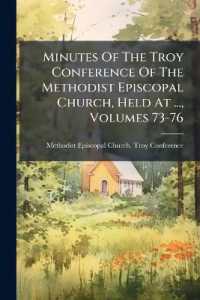Full Description
Curriculum and Teaching Dialogue (CTD) is a publication of the American Association of Teaching and Curriculum (AATC), a national learned society for the scholarly field of teaching and curriculum. The field includes those working on the theory, design and evaluation of educational programs at large. At the university level, faculty members identified with this field are typically affiliated with the departments of curriculum and instruction, teacher education, educational foundations, elementary education, secondary education, and higher education. CTD promotes all analytical and interpretive approaches that are appropriate for the scholarly study of teaching and curriculum. In fulfillment of this mission, CTD addresses a range of issues across the broad fields of educational research and policy for all grade levels and types of educational programs.
Contents
Editor's Notes: Serving Up Food for Thought in the Age of the Mobil Food Truck, Christy Moroye.
Volume 17, Number 1
Presidential Address: Education and Experience, Barbara Slater Stern.
Chapter 1. Tentative Steps into the Space of Another: Teacher Challenges of Crossing Cultures to Build Bridges with Students, Elaine Chan, Andrea Flanagan, Rita Hermann, and Nicole Barnes.
Chapter 2. Teaching and Learning of Fractions in Elementary Grades: Let the Dialogue Begin! Dittika Gupta and Trena L. Wilkerson.
Chapter 3. Education, the South, and the New Hegemonic Bloc, C. Steven Page and Andrew T. Kemp.
Chapter 4. Tom Tidler's Playground: A Public Curriculum of White Privilege, Matt Spurlin.
Chapter 5. The Day the Blocks Refuse to Stack: A Secret Many Early Childhood Educators Keep to Themselves, Jenn Gutiérrez.
Chapter 6. A Portrait of Residential Treatment from a Youth Perspective, Melissa Houser.
Chapter 7. Building Teachers' Social-Emotional Competence Through Mindfulness Practice, Elizabeth Hope Dorman.
Volume 17, Number 2
Editor's Notes: Properties of Decorum, David Flinders.
Chapter 1. An Alternative to Education Reform, Peter Taubman.
Chapter 2. Distance Education and the Evolution of Online Learning in the United States, Hope E. Kentnor.
Chapter 3. The Use of Questioning in Inquiry-Based Lessons with Bilingual Learners: Developing Academic Language and Discourse, Sharon H. Ulanoff, Alice M. Quiocho, and Kate Riedell.
Chapter 4. A Brave New Curriculum: Empowering Teachers and Students in Times of Trauma, Kathryn E. Engebretson and Alexandra M. Weiss.
Chapter 5. The School Experience of Gay Male Youth, Dustin Bailey.
Chapter 6. Revising Curriculum to Mentor Young Black Men, Sean Dickerson and Vonzell Agosto.
Chapter 7. Making Sense of Teaching: A Narrative Inquiry into Developing Knowledge Communities Among Preservice Teachers in India, Bobby Abrol.
Chapter 8. Catharsis in Education: Rationalizing and Reconciling, Paul Parkison.
Chapter 9. Organization Stories, Stories of an Organization: A Narrative Inquiry into a Curriculum and Teaching Community, Candace Schlein, Elaine Chan, and Vicki Ross.
Outtakes: Experiencing Beauty in Imperfection, Kate Kauper.
Book Review: Tiananmen Exiles by Rowena Xiaoqing He, Brittany Miller and P. Bruce Uhrmacher.







